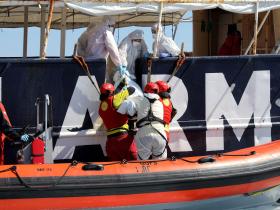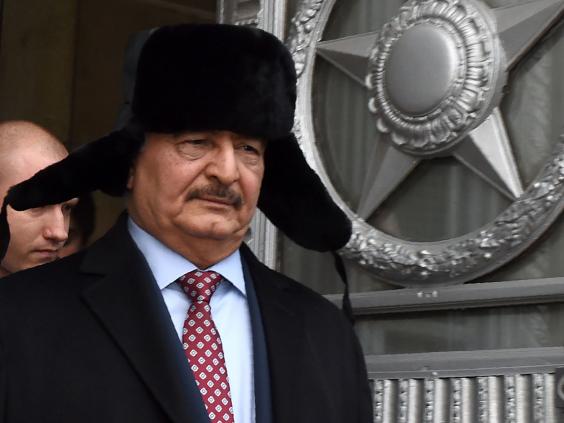Libyan court suspends deal struck with Italy aiming to reduce refugee boat crossings over Mediterranean Sea
Fresh blow for European ambition to increase cooperation with fragile Tripoli government
More than 240 refugees were feared drowned in the latest disaster off Libya this week Getty
A Libyan court has suspended an agreement struck with Italy aiming to reduce refugee boat crossings across the Mediterranean Sea.
A document released by the justice ministry in Tripoli did not give a reason for the move, which comes as an increasing numbers of migrants are launched by smugglers towards Europe with the arrival of spring.
“The justice ministry of the Government of National Accord (GNA) confirms that the court is still examining the issue in order pending a ruling, and that no final judgement has been issued,” it said.
The GNA is not recognised by Libya's Tobruk-based parliament, which backs a rival administration in eastern regions where a powerful Russian-backed warlord holds sway.
The rival parliament declared the agreement struck between Tripoli and Italy “null and void” in February and declared the GNA had “no legal status in the Libyan state”.
Continued conflict between warring parties since the Nato-backed removal of Muammar Gaddafi has worsened around crucial oil ports this month, endangering European efforts to replicate the EU-Turkey deal, which dramatically cut refugee crossings to Greece last year.
Rising arrivals to Italy sparked attempts to stem the flow by increasing cooperation with authorities in Libya, where 90 per cent of boats crossing the Central Mediterranean are launched.
Desperate journeys: Rescued at sea, refugees detail abuse in Libya
But the UN-backed GNA is failing to regain territory controlled by factions including Isis, while armed gangs and smugglers have capitalised on widespread lawlessness to detain, extort, enslave and eventually export migrants for profit.
More than 5,000 asylum seekers were killed attempting the treacherous crossing in 2016 and a record of at least 583 more have died so far this year, with fears of another 240 drowning when their dinghies sunk last week.
A deal struck between the Italian and Libyan prime ministers in February said it aimed to tackle people smuggling, with Paolo Gentiloni pledging millions of Euros and equipment to bolster the capacity of Libyan authorities.
The move, backed by fellow EU member states at a summit in Malta, alarmed the UN and humanitarian agencies who have long reported the murder, torture, rape and abuse of migrants in both government and militia-run detention centres.
The Libyan coastguard, being trained by the UK and other European nations, is additionally accused of attacking international rescue ships, shooting refugees and causing hundreds to drown.
Almost 22,000 migrants have been rescued at sea and taken to Italy so far this year, mainly from sub-Saharan African countries and Bangladesh.
In pictures: A day of refugee rescues in the Mediterranean Sea
EU leaders are aiming to shift some of the responsibility for search and rescue operations to the Libyan government and hope to set up new migrant camps in the country where failed asylum seekers can be returned to their home countries before journeying to Europe.
But the UN Refugee Agency (UNHCR) cautioned that it could take a long time for facilities to meet international humanitarian standards.
“There are a number of vital issues that need to be addressed regarding Libya,” Stephane Jaquemet, the UNHCR’s regional representative for southern Europe, told The Independent.
Interior ministers from Libya, Tunisia, Italy, Germany, Malta and other nations affected by the crisis released a fresh declaration to tackle the root causes of migration and combat smuggling on Monday, but it was unclear how their aim can be achieved.
Tensions are also increasing over Russia’s alleged support for General Khalifa Haftar, whose Libyan National Army resists the GNA.
Khalifa Haftar, commander of the Libyan National Army, leaves the Russia's foreign ministry after a meeting in November 2016 (AFP/Getty)
The 73-year-old veteran, who served under Gaddafi before fighting to oust him in 2011, visited Moscow twice last year and was invited on to Russia’s Admiral Kuznetsov aircraft carrier as it returned from waters off the coast of Syria in January, for talks with the defence minister.
Sir Michael Fallon criticised the discussions, saying: “We don’t need the [Russian] bear sticking his paws in.”
The Russian defence minister, Sergei Shoigu, responded by saying there was no “animal in Britain’s zoo that can tell a bear what to do”.
General Haftar has the backing of Egypt and the UAE but was shunned by Barack Obama’s administration. Donald Trump’s position remains unclear.
The head of US forces in Africa said there was an “undeniable” link between Russia and General Haftar, saying Russian troops were on the ground and “trying to influence the action” in the region.
Marine General Thomas Waldhauser said the US would “maintain a force” in Libya, where it backed local forces in the offensive to drive Isis out of its stronghold of Sirte.








